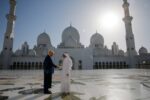As President-elect Donald Trump prepares to take office, the dynamic between his close ally, Elon Musk, and China’s leadership is attracting intense scrutiny. Tesla’s Shanghai gigafactory, crucial to Musk’s success, is a testament to the company’s strong ties to China, aided by key political figures like Li Qiang, China’s Premier.
Musk’s business ties with the Chinese Communist Party run deep, having met with top officials such as President Xi Jinping and Premier Li.
Musk’s controversial comments on Taiwan and the geopolitical implications of his actions make him a central figure in the delicate balance of US-China relations. With potential global trade wars looming, Musk might serve as a middleman, leveraging his unique position to navigate the increasingly tense diplomatic landscape between Trump and China.
However, the situation is complex. Musk’s influence and his role in the electric vehicle race make him indispensable to China, even as he faces fierce competition from local players like BYD.
As a highly respected pioneer in the industry, Musk’s moves could not only impact US-China trade but also shape the future of the global electric vehicle market. With China’s eyes fixed on Washington, Musk’s connections to both parties could play a crucial role in determining the outcome of global trade relations in the coming years.







